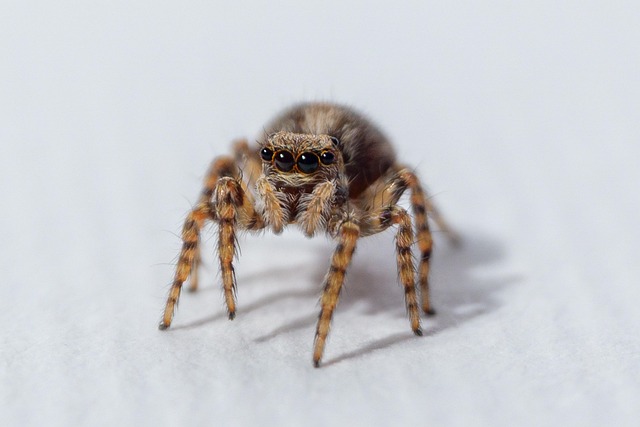Spider infestations can be managed and prevented through understanding their behaviors and implementing effective strategies. Professional spider control experts recommend sealing entry points, maintaining cleanliness, and using natural deterrents as eco-friendly solutions. Regular inspections, targeted treatments, and customized plans, such as sealing gaps and employing non-toxic repellents, are crucial for both residential and commercial spaces. By combining professional services with preventative measures like cleaning, sanitation, and prompt addressing of infestations, environments can be spider-proofed and maintained safely.
Tired of recurring spider infestations? Discover innovative tools and strategies to reclaim your space. This comprehensive guide explores effective spider infestation prevention methods, from understanding the behavior of these arachnids to leveraging professional spider control services and eco-friendly solutions. Learn essential spider-proofing tips for both residential and commercial settings, ensuring a lasting solution that keeps spiders at bay. Implement these tactics to create an unwelcoming environment for spiders and enjoy pest-free peace of mind.
Understanding Spider Infestations: Behavior and Habits
Understanding Spider Infestations: Behavior and Habits
Spider infestations can be a recurring nightmare for both residential and commercial properties, with various species exhibiting distinct behaviors and habits that contribute to their persistence. Professional spider control experts emphasize that comprehending these patterns is crucial in implementing effective spider infestation prevention strategies. Spiders are naturally drawn to dark, secluded spaces, making areas like attics, crawl spaces, and unused closets prime targets for colonization. Their web-building capabilities enable them to quickly establish territories, trap prey, and lay eggs, leading to rapid population growth if left unchecked.
Additionally, spiders are highly adaptive creatures, capable of locating new habitats based on heat signatures, carbon dioxide levels, and moisture content. This adaptability makes it challenging to eradicate them entirely with traditional pest control for spiders methods. Eco-friendly spider prevention solutions, recommended by professionals, focus on sealing entry points, maintaining excellent sanitation, and using natural deterrents. By integrating these spider prevention tips into residential or commercial spider-proofing strategies, property owners can significantly reduce the risk of recurring infestations, ensuring a safer, more comfortable living or working environment.
Professional Spider Control: Expert Strategies and Services
Professional Spider Control offers expert strategies and services tailored to address spider infestation prevention effectively. These professionals are equipped with in-depth knowledge and advanced tools to identify entry points, nest locations, and behavior patterns of spiders, ensuring comprehensive spider control. They employ eco-friendly solutions that are safe for both residences and commercial spaces, making them a preferred choice for those seeking sustainable spider prevention tips.
Residential and commercial properties alike can benefit from professional spider control services, which often include regular inspections, targeted treatments, and long-term strategies to keep spiders at bay. By understanding the unique challenges posed by different settings, these experts provide customized solutions, such as sealing entry points, implementing insect growth regulators, and using targeted pesticides when necessary. With their help, you can rest assured that your space is spider-proofed, maintaining a clean, pest-free environment.
Eco-Friendly Spider Prevention Solutions for Homes and Businesses
When it comes to tackling spider infestations, there’s a growing demand for effective yet environmentally conscious solutions. Traditional chemical-heavy pest control methods can be concerning for homeowners and business owners alike, especially those with health considerations or a commitment to sustainability. Fortunately, eco-friendly spider prevention is now more accessible than ever, offering a safer alternative to combat these arachnid invaders.
Professional spider control services have embraced innovative, non-toxic strategies that include regular inspections, sealing entry points, and using natural repellents. For residential spider prevention, maintaining a clean environment with minimal clutter and promptly addressing any web presence is crucial. Commercial spaces can benefit from similar practices while also investing in spider-proofing measures like installing mechanical traps or using pheromone-based deterrents. These eco-friendly spider prevention solutions not only keep unwanted visitors at bay but also ensure the safety and peace of mind for occupants.
Spider-Proofing Your Space: Long-Term Tips and Best Practices
Spider infestation prevention requires a multi-faceted approach that combines professional spider control with preventative measures. Implementing long-term strategies like regular cleaning, sealing entry points, and maintaining excellent sanitation significantly reduces the risk of recurring spider infestations. For residential areas, keeping homes clean, especially in corners and crevices, discourages spiders from setting up residence. Using eco-friendly spider prevention solutions, such as essential oils or natural repellents, can be effective without resorting to harsh chemicals.
In commercial spaces, regular inspections by professional spider control services are crucial. These experts employ advanced techniques like heat treatments and targeted applications of pesticides to eliminate existing spiders and deter future infestations. By combining these methods with proper maintenance and regular cleaning routines, businesses can create an environment that discourages spiders from entering or staying. Effective spider-proofing involves addressing current infestations promptly while implementing preventative strategies to ensure a long-term solution for both residential and commercial spaces.
In conclusion, addressing spider infestations requires a multi-faceted approach. By understanding the behavior and habits of these arachnids, you can implement effective strategies tailored to your specific needs, whether it’s through professional spider control services or eco-friendly prevention solutions. For residential or commercial spaces, following best practices for spider-proofing can significantly reduce reoccurrences. Integrating these tips into your pest control plan ensures a comfortable and spider-free environment, enhancing the overall quality of life.
